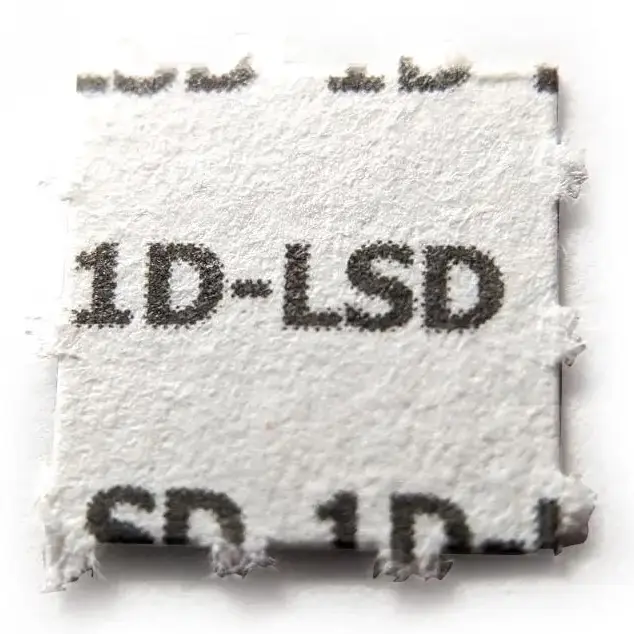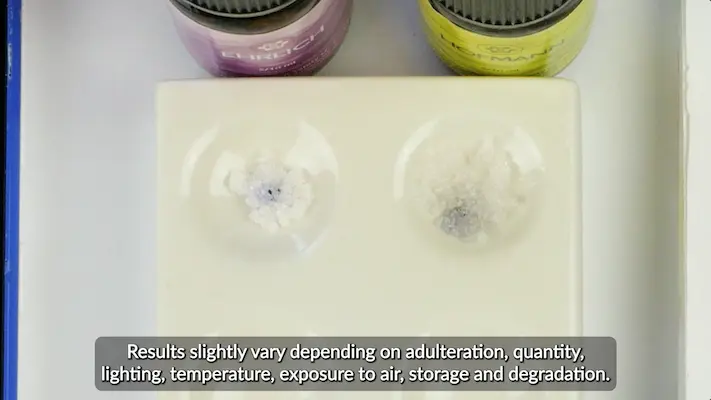1D-LSD - INFORMATION AND HARM REDUCTION
What is 1D-LSD?
1D-LSD, also known as 1,2-dimethylcyclobutane-diethylamide lysergic acid, is a chemical compound from the group of psychoactive substances that act on the nervous system. It belongs to the group of lysergamides, similar to LSD (lysergic acid diethylamide). 1D-LSD is considered a “prodrug,” which means that it can undergo transformation in the body into an active substance that exerts psychoactive effects – in this case, LSD.

Description and History of 1D-LSD
1D-LSD was first synthesized in a laboratory very recently. Unlike LSD, there is much less information and scientific research available about 1D-LSD. Due to the lack of clinical studies and safety data, using 1D-LSD may come with unknown risks.
VIDEO: Do's and don'ts of using 1D-LSD (turn on subtitles)
How Does 1D-LSD Work?
The mechanism of action of 1D-LSD is similar to LSD. It primarily works by affecting serotonin receptors in the brain, leading to changes in the processing of sensory and emotional information. This can result in psychedelic experiences, such as altered perception of time, shapes, and colors, as well as a deeper sense of introspection.1D-LSD: Effects
1. Hallucinations: 1D-LSD is known for its ability to induce intense hallucinations, both visual and auditory.1D-LSD: Duration of Effects
- Onset of Effects: 1D-LSD effects typically start around 30-60 minutes after ingestion.
- Peak Effects: The peak of 1D-LSD’s effects usually occurs approximately 4-6 hours after ingestion.
- Duration of Effects: The total duration of 1D-LSD effects typically ranges from 10 to 14 hours.
- Fading of Effects: 1D-LSD effects may gradually fade, and the feeling of “returning to reality” can last up to 24 hours.
1D-LSD: Dosage
- Low Dose (25-75 µg): May lead to subtle changes in mood and perception.
- Moderate Dose (75-150 µg): This is the range where more pronounced visual effects and perceptual changes may occur.
- High Dose (150+ µg): High doses can induce intense hallucinations and profound alterations of consciousness but come with the risk of anxiety and disorientation.
Video: Effects of 1D-LSD (turn on subtitles)
Harm Reduction: 1D-LSD
Do not use 1D-LSD, especially if:
- You have a history of mental illness or a family history of mental disorders.
- You are in an unstable emotional or mental state.
- You are in an uncontrolled or unfamiliar environment.
- You have a history of bad drug experiences or hallucinations.
Here are some basic harm reduction tips for using 1D-LSD:
- Always have trusted friends nearby who can assist you if needed.
- Establish a suitable environment that is quiet, safe, and comfortable.
- Maintain proper hydration but avoid excessive drinking.
- Do not mix 1D-LSD with other psychoactive substances.
- Remember that the effects of 1D-LSD can last for many hours, so keep this in mind in your planning.
- Always test 1D-LSD for purity using a reliable drug testing kit like PRO Test. Learn how to test 1D-LSD by checking out the article /how-to-test-LSD/.
Click the article above to read how to test 1D-LSD.
Mixing: 1D-LSD
It’s best not to mix any psychoactive substances, but if you find yourself in a situation where you have combined 1D-LSD with other substances, it’s essential to be aware of potential risks. Here is a list of the main risks associated with mixing 1D-LSD with popular psychoactive substances:- 1D-LSD and Alcohol: It can lead to disorientation and an increased risk of alcohol abuse.
- 1D-LSD and Benzodiazepines: The combination can reduce the intensity of 1D-LSD effects but may also lead to significantly greater risk of uncontrolled behavior.
- 1D-LSD and DMT: It may lead to intensified psychedelic experiences and disorientation.
- 1D-LSD and GBL: Increased risk of disorientation and potential health issues.
- 1D-LSD and GHB: The combination can lead to an increased risk of disorientation and potential health problems.
- 1D-LSD and Psilocybin Mushrooms: It can amplify psychedelic effects and disorientation.
- 1D-LSD and Serotonin Reuptake Inhibitors (SSRI): It can reduce the intensity of 1D-LSD effects and lead to less predictable outcomes.
- 1D-LSD and Ketamine: The combination can lead to intensified dissociative experiences and disorientation.
- 1D-LSD and Caffeine: It may enhance stimulating effects and potentially increase alertness.
- 1D-LSD and Cocaine: Increased risk to the cardiovascular system and potential danger.
- 1D-LSD and MDMA: It can lead to intensified psychedelic effects.
- 1D-LSD and MAO inhibitors (MAOi): It can reduce the intensity of 1D-LSD effects and lead to less predictable outcomes.
- 1D-LSD and Methamphetamine: The combination can overly stimulate the cardiovascular system.
- 1D-LSD and NBOMe: It may intensify effects and increase the risk of adverse reactions.
- 1D-LSD and Opioids: Increased risk of respiratory depression and overdose.
- 1D-LSD and Nitrous Oxide: It may intensify dissociative effects and disorientation.
- 1D-LSD and THC: It can intensify psychedelic experiences and increase the risk of anxiety and paranoia.
- 1D-LSD and Tramadol: Potential risk of serotonin syndrome and other adverse effects.
Is 1D-LSD Legal?
1D-LSD is often classified as a research substance, which means it can be used for research purposes but is not legal for recreational use in many places. It may fall under the analog law regarding substitute substances.Sources:
- erowid.org
- dmt-nexus.me
- psychonautwiki.org
- tripsit.me
- wikipedia.org
Disclaimer
The information presented on this page is not intended to promote drug use. Many of the substances mentioned are illegal according to national and international law, and possessing these substances is punishable by law. Never assume that a substance is safe. The concentration, purity, and additives can vary greatly, even if the samples come from the same source or look similar. Chemical Safety sp. z o.o. strongly discourages the use of any psychoactive substances – legal or illegal. Using psychoactive substances always carries health risks that can be avoided.
